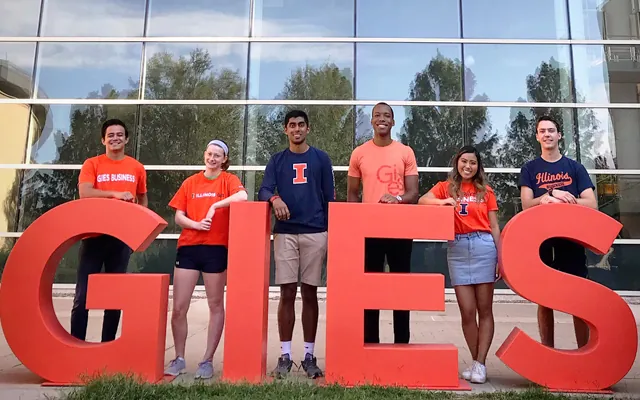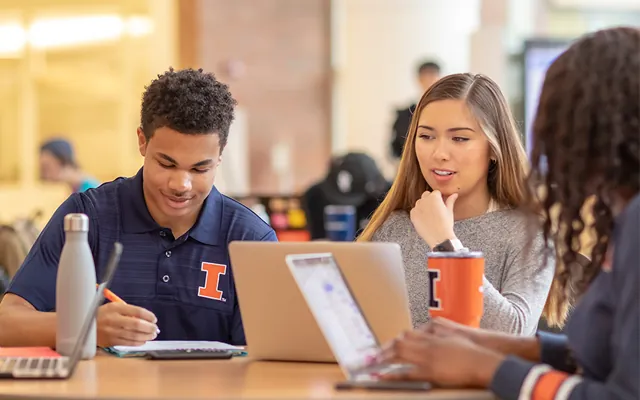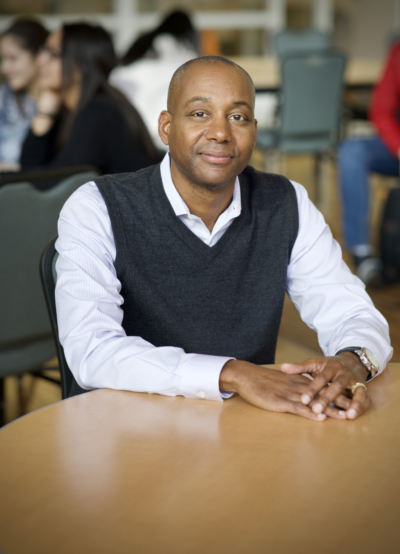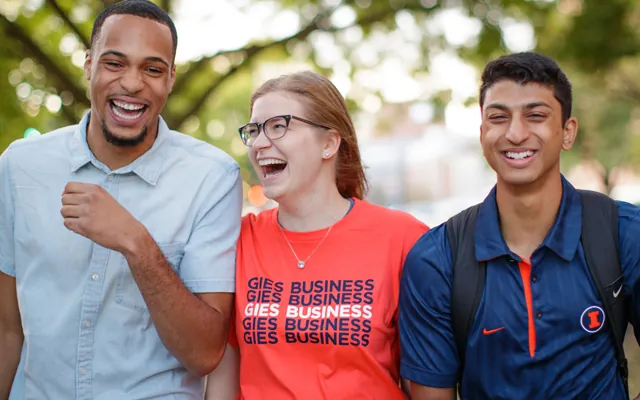
University of Illinois, Gies College Of Business
The value of some business schools can’t be measured by rankings. Their revolutionary course designs or partnerships don’t necessarily correspond to inputs and outputs, let alone student surveys. That’s the curse of the Gies College of Business, long a hotbed of innovation. This year, Gies rose from 17th to 12th in the 2022 P&Q Undergraduate Business School Ranking. That’s an impressive move, but it’s hardly Gies’ most interesting story.
After all, GIes is the program that allows Business minors to take some of their classes online. In September, the school announced that it had earned an IDEAS grant from the U.S. Department of State. IDEAS is short for Increase and Diversify Education Abroad for U.S. Students and the $33,000 in funding will be used to launch a series of Gies Global Hubs. Starting in Chicago — and expected to expand into Ghana, Greece, Ecuador, and China — the hubs will enable Gies sophomores to study a particular theme overseas, such as education or health.
“At Gies, we promise students that an education is just the start,” said Gies’ Director of Study Abroad Nicole Lamers. “We promise to provide an environment, experiences, and the resources that foster meaningful actions to empower students to put their purpose into practice so they can positively impact their community, the nation, and the world.”
In even bigger news, Gies announced in June that it would expand what it describes as the country’s largest experiential learning course — Business 301: Business in Action. Taught to juniors, the required course paired 800 business students with over 130 companies ranging from Fortune 100 powerhouses to nonprofits. In the pilot, Business 301 students worked in six member teams to work directly with clients to develop strategic solutions to the kinds of issues they’ll face after graduation. And students have certainly bought into the premise. According to the school, 95% of pilot students believe the course makes them more attractive to employers.

Gies student team working on a project
One of those students was Diana Graciano, a first generation transfer student. “Some of the skills that I learned in this class helped me get a lot of interview callbacks, helped me gain a lot of experience, and helped me get two internship offers both with great companies.”
The Business 301 course also dovetails well with Gies’ portfolio of courses, which also heavily on experiential learning. “My supply chain practicum was what I learned the most from,” explains one 2019 Gies grad who completed P&Q’s survey. “It was one of the first times I needed to analyze big data to generate insights for a client. While I could partly rely on my technical and analytical experiences from school, it was also incredibly helpful to have the Caterpillar professionals’ mentorship and guidance as our team worked through the project. It was powerful to see firsthand how they recommended approaching the situation. Finally, it was great to gain firsthand experience navigating “messy” obstacles that you don’t encounter often in the classroom, such as data reliability issues or considerations that limited our ability to implement our ideal solution. We had to pare down our final recommendations because the older ERP system that this team used didn’t have the computational power to do what we wanted. In my two years in consulting, I’ve encountered on several occasions these same challenges — analyzing big data to solve an ambiguous problem, creatively addressing data reliability issues, or considering pragmatic limitations to my ideal solutions. As a result, experiential learning at Gies prepared me well for my career.”
The numbers also reflect a school gaining momentum. This fall, average SAT scores rose from 1,374 to 1,408, with ACTs and undergraduate GPAs coming in at 31.6 and 3.94 respectively. The school also remains one of the country’s most diverse, with 14.7% of students hailing from overseas and 41.46% being women. When it comes to overall satisfaction, Gies scored particularly well in 2022 alumni survey responses relating to the school’s ability to help students improve their soft skills and boost their socio-economic status.
What else is happening at the Gies College? This month, P&Q reached out to Kevin Jackson, the school’s associate dean of undergraduate affairs. Here are his insights on what makes the Gies experience so distinctive.
5 QUESTIONS WITH KEVIN JACKSON

Kevin Jackson
P&Q: What are your undergraduate business program’s two biggest strengths and how do they make students better prepared for business once they graduate?
Jackson: “One of our biggest strengths is what we call our “cohort curriculum.” It’s a series of four courses, which includes professional responsibility, a business simulation, and real client project, and senior-level global perspectives of business. Our students go through this series of foundational courses together. Not only does it help create lifelong relationships with their own cohort, but they’re also learning to help the younger cohorts as they become course section leaders in future years. These courses help us deliver on our mission so that every student has a class on ethics and social responsibility and they are able to understand businesses from the inside out through cases and experiential learning opportunities. This commitment to experiential learning provides value for both our students and the corporations we partner with.
Another one of our biggest strengths is our extracurricular and co-curricular activities that enable students to follow their passions and dive deep into the topics that most interest them. The Disruption Lab provides opportunities for students to learn about and experiment with emerging technologies like blockchain, artificial intelligence, and more. Through organizations like Illinois Business Consulting, they can work in teams to solve business problems for real clients. We also have a number of specialized academies in investment banking, investment management, finance, risk management and more, which offer advanced academic and career-building opportunities. So no matter what aspect of business a student is interested in, they can find additional opportunities to suit their needs.”
PQ: What are some new and upcoming developments in your program that will enhance the business program for future business majors?
Jackson: “We’re moving away from a “traditional” career services model into more of a professional development model, which includes heavy corporate engagement. The idea is that our students will develop relationships with firms and recruiters long before they’re ready to accept their first job.
We’re also very excited about the launch of our Disruption Lab. It’s a way for our students to learn about new technologies like blockchain, artificial intelligence, and more. By experimenting with these new technologies that are disrupting business, Gies students will know how to leverage future disruption for their organization’s benefit.”

Gies students outside class
P&Q: Gies boasts one of the world’s best online infrastructures. In fact, business minors can take some of their courses online. How does Gies leverage its online capabilities to benefit undergraduates?
Jackson: “Over the last few years, we have opened up our business minor to everyone on campus. To do this, we moved all of our core (i.e., required) business minor classes online, and the result has been tremendous growth in the minor. This shift online has also enabled us to better reach students who are studying abroad or participating in our Sophomore Year of Purpose pilot this spring. Knowing they’ll have a quality online experience means our students feel confident taking classes in the summer or any other time their schedule allows. Online has also enabled us to successfully onboard students remotely. During the pandemic, we have been able to present them with a good indication of life at Gies without necessarily having to be on campus.”
P&Q: When alumni look back on their time at Gies, what would they consider to be their signature experience? How does it bring the best of the best of the Gies experience together?
Jackson: “For many of our students, their signature experience has been meeting the namesake of our college, Larry Gies. Mr. Gies has made a tremendous impact on our college both through his generous financial investment, but also through his time investment. We are a university of traditions, and Mr. Gies has become the face of one our newest traditions. Signing Day at Gies is the day we celebrate our undergraduate students as they declare their majors. Student walk the stage to make their declarations while their peers cheer for them and their families watch the online broadcast. Larry Gies regularly sits on the stage and engages each student making their major declaration. It is a sight to behold and many of our students cherish that experience.”

Larry Jackson meeting with Gies students
P&Q: Which employers are the biggest consumers of Gies undergraduate talent and what have they told you about your alumni that make them so special?
Jackson: “The Big Four accounting firms (Deloitte, PwC, KMPG, EY) are the four largest consumers of Gies talent along with world-renowned companies like Protiviti, Grainger, PepsiCo, Accenture, and Amazon.
The overall theme from employers is that Gies students are well prepared for the jobs they are hired for. The learning curve is minimal, and companies notice that our students are fast learners and do their jobs well. Here are some anecdotes we gathered from recruiters:
* “Gies prepares students for professional careers. Gies students are prepared to engage with companies and have a professional demeanor. The students hired from Gies easily transition to the professional work environment.”
* “Gies students are positioned exceptionally well to start as new hires due to their strong technical foundation and global perspective when they enter the workforce.”
* “The curriculum at Gies prepares students to begin their careers with a strong business acumen along with understanding how their areas of focus fit into the larger professional services landscape.”
* “Talent from Gies and the U of I campus is exceptional. The University is home to brilliant minds and eager learners. We continuously have chosen to partner with Gies through experiential learning because of the quality of students is so high.”
Next Page: Arizona State’s W. P. Carey School










